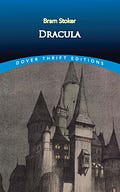Dracula 17
Study Guide Questions for Ch. 17 “Dr. Seward’s Diary (Continued)”
If you are looking for the beginning of the study of Bram Stoker’s Dracula then you can go HERE for a brief introduction. At the bottom of the introduction you will find the links to each section of the study guide as it becomes available. If you would like to see the growing list of available book studies available for free on this site you can go HERE. Enjoy!
Virtues/Vices/Great Ideas: (Find them in the Text)
Light vs. Darkness, Appearance vs. Reality, Hospitality, Compassion, Grief
Grammar Questions: (The Information of the Text)
What was Mina’s reaction to entering the “lunatic asylum?”
How did Dr. Seward respond, at first, to Mina’s suggestion that he should let her copy his audio diary via her typewriter?
What “Cruelly true” thing did Mina say that the phonograph recorded which would not carry across in written form?
What was Dr. Seward’s judgment of Jonathan upon meeting him?
What did Renfield mention that he desired to do (which he had not as yet done before)?
What Had Jonathan Harker been doing in the time immediately preceding his coming to meet the rest at Dr. Seward’s home?
What did Mina say had removed any pity from her heart concerning Dracula?
What happened between Lord Godalming (Arthur) and Mina that helped him greatly?
What did Mr. Morris say, “No one but a woman” could possibly do for a man?
Logic Questions: (Interpreting, Comparing/Contrasting, Reasoning)
Why did Van Helsing say, “You will need all your faith, even you who have had such an experience as that of to-day?” What, specifically, about the task that was laid before them would require more faith than ever?
Why did Dr. Seward’s proclamation that he was an “Honest Indian” give himself away as not being completely truthful?
Mina set herself to work on putting all the records in “chronological order.” Why might that be helpful to the group?
Though he scolds himself for having had “enough clues” to deduce it, why might it not have occurred to Dr. Seward to connect Renfield’s behavior to the case of Count Dracula?
Why might Renfield suddenly be speaking about a desire to go home?
Why were all the men Jonathan Harker spoke to so uncommonly thirsty?
Why did Lord Godalming (Arthur) break down and weep in Mina’s presence?
Rhetoric Questions: (The Analysis of Ideas in the Text)
Mina noted, of Dr. Seward’s gramophone diary, “That is a wonderful machine, but it is cruelly true. It told me, in its very tones, the anguish of your heart. It was like a soul crying out to Almighty God.” What are some truths which we should take away from Mina’s observation about the difference in effect between the audibly spoken word versus the written word? How should this impact our daily lives and efforts in communication? Since Rhetoric is the art of persuasion, both in writing and speaking, what impact does this observation have on the craft of persuasion?
Mina said, “in the struggle which we have before us to rid the earth of this terrible monster we must have all the knowledge and all the help which we can get.” What is the relationship of knowledge to strength? In what way is knowledge a kind of strength? Conversely, why is ignorance something that is debilitating (i.e. that which makes one weak)? How should these observations temper or inform the kind of things we pursue in our times of leisure?
Do you agree with the perspective of men and women portrayed in this present chapter? Are men in need of women in order to show the kind of emotion that Arthur needed to show in mourning the loss of Lucy? Do women naturally have a “maternal instinct” which makes them more ready, able, and willing to provide comfort to a man who is suffering than his fellow men can offer? Explain your thoughts about the differences between the sexes.
Theological Analysis: (Sola Scriptura)
Read Proverbs 1. How does this passage relate back to our story and the need for knowledge in order to do what is right?
Read Proverbs 31:10-31. Compare and contrast the godly woman picture here with the character of Mina (in this chapter and throughout the book). What commonalities do you see? Are there any obvious contrasts you would point out?


